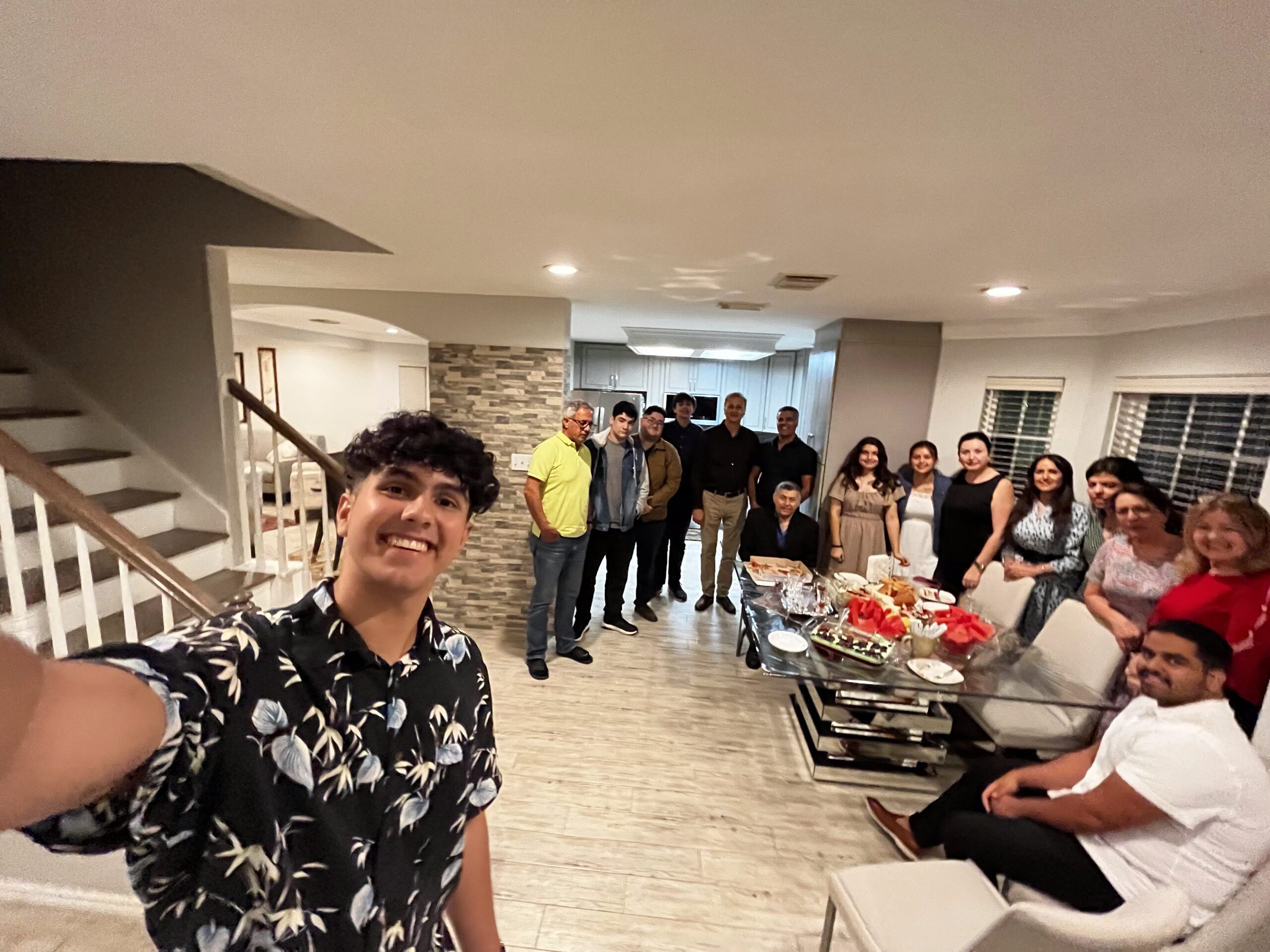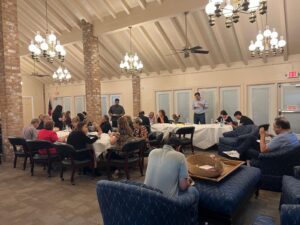
Houston Community Revitalizes Feast Gatherings

By: Layli Miron
Every Central Figure of the Bahá’í Faith has championed Nineteen Day Feast gatherings as keystones of community life. The Báb and Bahá’u’lláh ordained that local communities should gather on the first of each Bahá’í month. Abdu’l-Bahá wrote:
“As to the Nineteen Day Feast, it rejoiceth mind and heart. If this feast be held in the proper fashion, the friends will, once in nineteen days, find themselves spiritually restored, and endued with a power that is not of this world.”
Shoghi Effendi, the Guardian of the Bahá’í Faith, specified that the Feasts should include devotions, consultation on community matters, and socialization to create fellowship. Beyond these outlines, communities have many options in how they design their Feast gatherings.
Sometimes, the consultative portion of Feast, which usually includes reports on recent activities, the status of the local Fund, and open discussion, can become the focus. In Houston, this administrative emphasis had characterized Feasts for some time. To quote a younger participant, it led to gatherings that felt “boring.” As the 2020 pandemic restrictions were lifted and people could once again gather in person, the need to revitalize Feast gatherings became apparent. Community members turned to Houston’s Local Spiritual Assembly for support.

Many expressed a wish that face-to-face gatherings would become the norm once again. It was still important to offer a virtual option to make Feast accessible to immunocompromised and disabled community members—but did everyone need to receive the video conference link? When a virtual option for Feast was universally available, many people would opt to join online rather than in person. “A lot of the comments were like, ‘Well, I could have come, but it’s easier to be on my phone or my computer from home,’” explains Adib Shafipour, who currently serves as the Assembly’s chairperson. The Assembly now offers a link specifically to those who have requested it, which has gently encouraged community members to rejoin in-person gatherings.
Recognizing a thirst for greater joy and fellowship at Feast gatherings, the Assembly decided to put more youth at the helm, recognizing this age group’s unique capacity for creativity and experimentation. In 2021, the Universal House of Justice lowered the voting age in Bahá’í elections to 18. Subsequently, Shafipour says the Houston Assembly contemplated, “How could youth be mobilized to take ownership of the Administrative Order?” As one answer, the Assembly appointed a greater proportion of teens and young adults to serve as Feast Coordinators in some sectors.
The newly appointed coordinators infused verve into the gatherings with more music and dynamic, interactive Feast reports, which they themselves present. Reflection questions invite the community to articulate their ideas rather than simply listening. They also ensured that other young people would feel included by asking them to help set up or to prepare devotions. “We’re motivating each other to be more involved in the Feast,” says Shervin Mokhtari, a youth and one of the Feast coordinators in Houston’s west sector.
Mokhtari recalls that previously, teenage participants would sit alone with their smartphones. That’s changed: “The youth are engaging with each other now more. Before they’d stay strangers despite seeing each other every month. Now they’re actually trying to connect and bond.” Beyond friendships forming between peers, Mokhtari observes more multigenerational interactions: “I think we feel more connected with the adults; I actually have conversations with them!”
Young coordinators such as Rasa Hamedian see Feasts as a gateway for Bahá’ís of all ages to join core activities such as study circles, devotional gatherings, children’s classes, and junior youth groups. “When I was younger, I wouldn’t pay too much attention to the Feast,” he says. That has since changed: “There have been so many beautiful improvements in the Feast since I was a junior youth. Now that I am 16 and the Assembly has appointed me as a Feast Coordinator, I am always thinking about how to mobilize the adult believers to engage with the Plan.”

Engaging children during Feast is also a priority. The coordinators organize activities for children while the adults consult. Typically, under the guidance of a parent, the community’s junior youth lead the younger children in an activity, which the children then present to those gathered.
One community member shares that the transition was not without challenges. Making space for youth to lead required that older community members who traditionally managed community affairs, practice detachment and patience, in addition to providing accompaniment to the youth arising to serve. This provided an opportunity for the community to engage in dialogue, learn from one another, and strengthen bonds.
The youth, for their part, have been building their capacity through engaging with the Ruhi Institute and finding creative ways for the administrative activities of the Faith to advance the Nine Year Plan. As some youth have taken on the responsibility of chairing Feasts, they continuously accompany one another in learning.
Feast attendance has soared, especially among children and youth. “The more attendance, the more diversity, and the more need for accommodation,” says Mokhtari. One example of this diversity is Houston Bahá’ís’ numerous linguistic backgrounds. The Feast coordinators have devised creative ways to include participants who are more comfortable with their mother tongue, sharing translations in the sector’s group message platform and asking multilingual participants to interpret. Because each Feast team focuses on a single sector, they are becoming increasingly attentive to their local reality. Even within Houston, one sector’s needs for Feast differ from another’s.
Former Feast coordinator Armin Shafipour, a youth, remembers Feasts feeling obligatory, with community members attending out of duty rather than desire. Now, Feast has become something to look forward to, an opportunity for the spiritual restoration and empowerment that Abdu’l-Bahá envisioned.




